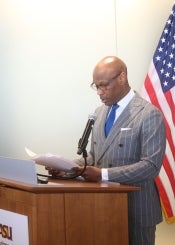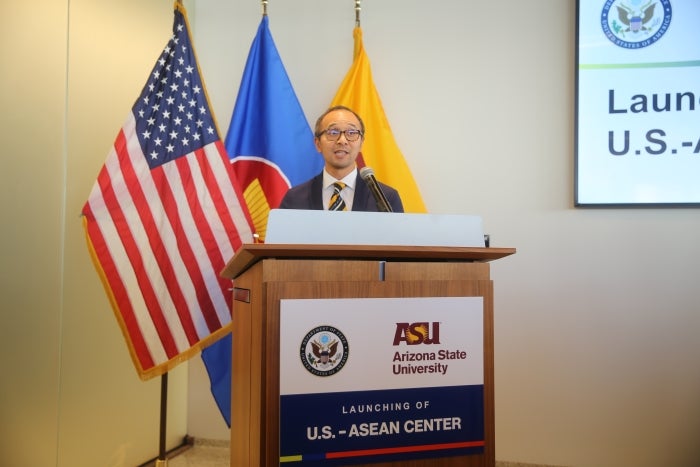ASU inaugurates US-ASEAN Center in partnership with Department of State

The Barrett & O'Connor Washington Center is the home of the new United States and the Association of Southeast Asian Nations Center. Photo by by Samantha Chow/ASU
Editor’s note: This story is featured in the 2023 year in review.
Last week, Arizona State University, in partnership with the U.S. Department of State, celebrated the grand opening of the United States and the Association of Southeast Asian Nations (U.S.-ASEAN) Center in Washington, D.C.
Situated in the heart of D.C. at the ASU Barrett & O'Connor Washington Center, the new U.S.-ASEAN Center will deepen the relationship between the U.S. and ASEAN while bolstering support for U.S. economic and cultural engagement with Southeast Asia.
“Arizona State University is grateful for the opportunity that the U.S. Department of State and the Biden Administration has given us to host the U.S.-ASEAN Center here in our nation’s capital,” said Chris Howard, executive vice president and COO of ASU Public Enterprise, who gave opening remarks ahead of the ribbon-cutting. “We are privileged to be the implementing partner for the U.S.-ASEAN Science, Technology and Innovation Cooperation Program. It is the perfect marriage of our mission and the goals that the United States shares with the members of the Association of Southeast Asian Nations.”
The center’s opening comes months after Vice President Kamala Harris announced plans to establish a hub in Washington, D.C., through a public-private partnership during the U.S.-ASEAN Summit in Jakarta.
Activities at the U.S.-ASEAN Center will help connect key private sector organizations, academic institutions and civil society, and promote an open, connected, prosperous, resilient and secure Indo-Pacific region. The center also serves as a satellite campus and home to other interdisciplinary partnerships, sectors and one-of-a-kind academic programs.
Recognizing US-ASEAN’s role for cooperation
Indonesia, which hosted the 2023 ASEAN Summit and is one of the founding five countries of ASEAN, has played a vital role in shaping the vision and goals for the member association. Sade Bimantara, charge d’affaires with the Embassy of Indonesia, gave remarks on the meaning of the relationship between ASEAN and the U.S. at the center’s opening.
“In the past year, we have elevated to a comprehensive strategic partnership — making ASEAN and the U.S. diplomatic and security partners. This is why when the idea of establishing this center was first brought up almost two years ago, we embraced it,” Bimantara said.
“I look forward to the work initiative of the center that will further support academic civil society engagement, research understandings of AI and other technology and science, operation and deployment of the empowerment of SMEssmall and medium-sized enterprises that are the backbone of the economies, and building and strengthening linkages between ASEAN and the U.S.”
Texas Congressman Joaquin Castro, current ranking member and former chair of the House Foreign Affairs Committee, said he worked closely with colleagues in Congress to put a spotlight on key priorities in ASEAN.
“As you all know, President Obama brought U.S. engagement with Southeast Asia and ASEAN to a new level. Since the end of his term, I have sought to keep that momentum going in Congress,” Castro said.
Castro, along with Sens. Mitt Romney (Utah) and Chris Van Hollen (Maryland), introduced legislation earlier this year to expand economic and technological partnerships, support people-to-people ties and cultural engagement, and strengthen relations with Southeast Asia.
“This morning, the U.S. House of Representatives voted to pass the U.S. ASEAN Center Act as part of the fiscal year 2024 NDAA, which now heads to President Biden’s desk,” Castro said. “This legislative victory comes on the heels of several important accomplishments from the ASEAN caucus members in recent years. The legislation would provide ASEAN with diplomatic privileges and immunities. ASEAN would be treated in the same manner as the European Union, the Organization of American States or the African Union.”
Sen. Tammy Duckworth (Illinois), who spoke at the center’s opening, was born in Thailand, and reminisced about growing up in Southeast Asia. She explained how the deepening relationship between the U.S. and ASEAN will help countries “learn from, and lean on, each other.”
“As we take on the unique challenges of the 21st century — climate change, AI, the pandemic, the rise of racism, more wars, regional conflict — we have to understand that these are not the kinds of problems that recognize national borders,” Duckworth said. “Given the moment we're living in, our only chance to bring about a safer, greener, more prosperous future, is by taking on global problems by developing global solutions with global partners. I truly believe that this center will help ensure that United States begins to do more.”
A decade of partnership
Under Secretary of State for Public Diplomacy and Affairs Liz Allen recently returned from her visit to Indonesia, where she oversaw expansion of the Fulbright program to religious schools and advocated for increased student exchanges. She delivered final remarks to highlight the country’s strong ties and enduring strength of the U.S.-ASEAN relationship.
“The hunger for this center is real, is visceral. People are very excited to see this commitment by the United States to our partnership, because it is a tangible way to represent this partnership and to offer a platform for programming,” Allen said. “They are eager for us to invest in them, to give them a platform to solve the problems in their communities and the solutions they know are needed, but that we can only help give them with purposeful investment.”
ASU is a longstanding partner with ASEAN across the Indo-Pacific region, working with its member states for more than 10 years. This includes a national partnership in Vietnam since 2009, collaborating with government agencies, institutions of higher learning and industry partners such as Microsoft, Amazon Web Services, Oracle and IBM to improve the quality of STEM higher education programs and graduates through the HEEAP, VULII and BUILD IT projects. These capacity projects leverage deep and diverse government-industry-academic partners that share a goal to develop work-ready engineers and scientists.
“Through our public-private partnership with the U.S. government and ASEAN, ASU continues to support joint research, student and faculty exchanges, and academic program partnerships and pathways,” said Jeffrey Goss, executive director in the Office of Global Outreach and Extended Education, part of ASU's Ira A. Fulton Schools of Engineering. “This center is well-positioned to facilitate coordination on critical issues for all ASEAN nations, and holds great potential as we work to build economic opportunity for decades to come.”
ASU’s University Design Institute is also leading a five-year initiative to improve the higher education system in the Philippines, and is participating in the Higher Education Partnership Initiative in Indonesia.
Funded through the U.S. Department of State, ASU is the implementing partner of the ASEAN Science, Technology, Innovation Cooperation project and the Mekong-U.S. Partnership Young Scientist Program, leveraging its experience in project implementation across Southeast Asia.
ASU’s Watts College of Public Service and Community Solutions has also hosted a Young Southeast Asian Leaders Initiative Academic Fellowship, or YSEALI, on civic engagement each year since 2016.
“The Young Southeast Asian Leaders Initiative is not just our premier exchange program in Southeast Asia,” said Allen, who said the program has more than 6,000 alumni to date. “Since YSEALI launched 10 years ago, its digital network has grown to over 155,000 members; those youth changemakers are the future, and we feel called to invest in them.”
Through national-scale projects like the USAID Higher Engineering Education Alliance Program and BUILD-IT projects in Vietnam, USAID Higher Education Partnership Initiative in Indonesia and the Young Southeast Asian Leaders Initiative, ASU has played a pivotal role in fostering collaboration and knowledge exchange among young scientists and youth across ASEAN.
“We know it's just the beginning. We have a lot of work ahead of us to make it a dynamic, living, breathing platform in partnership,” Allen said. “We look forward to talking all to all of you about what you'd like the center to be and how we can partner together.”
More Local, national and global affairs

Arizona PBS is now free to stream for Prime Video viewers in the US
Arizona PBS is now available for streaming on Amazon Prime Video. A new partnership between PBS and Amazon brings the station’s primary, high-definition broadcast channel, along with the 24/7 PBS…

First-ever Taiwan Symposium at Thunderbird celebrates business, cultural connections
The investment by TSMC and other Taiwanese corporations in Arizona will reap dividends not only in thousands of new jobs but also in strengthened cultural connections and new methods of…

Study shows that trust drives successful market economies — but not in the way you may think
From fueling our cars to fulfilling daily coffee habits, the average U.S. cardholder makes 251 credit card transactions per year, according to Capital One.Each of these transactions are built…



